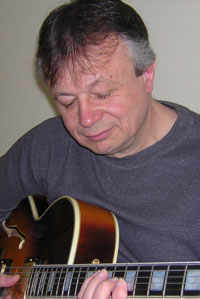"In my private lessons in mainstream jazz guitar, my teaching style is really hands-on. I'm more interested in jumping into the pool with my students, finding out what they're successful at, and what they're not, and seeing what works. It's easy to get overloaded and overwhelmed with theoretical information; I know I do. I'm not knocking the theoretical aspect, but I can look at all those books in the bookstore and just think, 'I don't know this, I don't know that.' You can't know everything."
"I do a lot of playing with students, and I really push for them to get together and play with other students—both guitarists and those who play other instruments. Playing with others is just as important as sitting in the practice room. And the guitar is kind of a neat instrument because it's great as both an improvising or solo instrument and as an accompaniment instrument, so it's really easy to get just two people together and get a lot done."
"Good musicianship is about the fundamentals; it doesn't have to be intricate to be good. Technique is fine, but it's not everything. I stress accompaniment skills and time feel a lot. For most players, time feel is probably the most important skill, because you're usually part of a rhythm section. Your job a lot of times is to complement what's going on, so you have to be really good at listening to and interacting with other musicians. That's what makes great players great."
"When my students ask me questions, they force me to think about things I might take for granted. Sometimes they ask me things that I never even considered, and I learn about them, or they show me things they're doing and I go, 'Wow, that's a great new perspective.' It keeps things interesting. I'm sure I learn as much from my students as they do from me. I often feel I'm more like a coach or mentor rather than somebody telling them exactly how to do something, because I don't think there's just one way that works for everybody."

